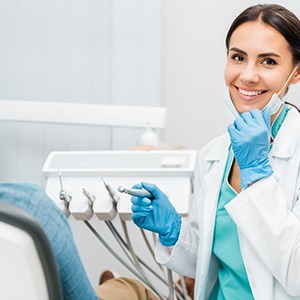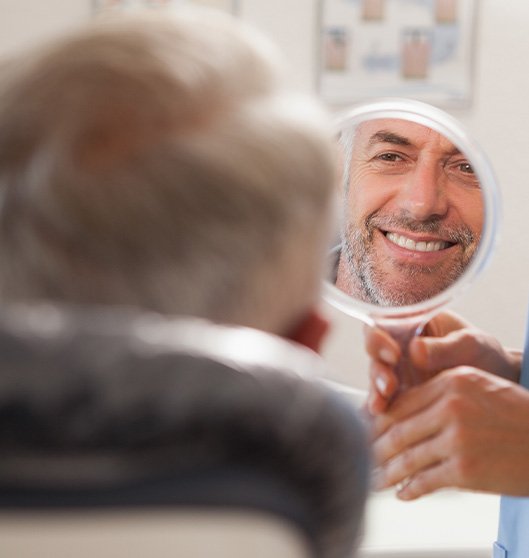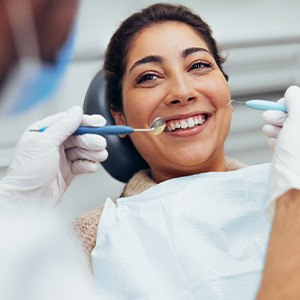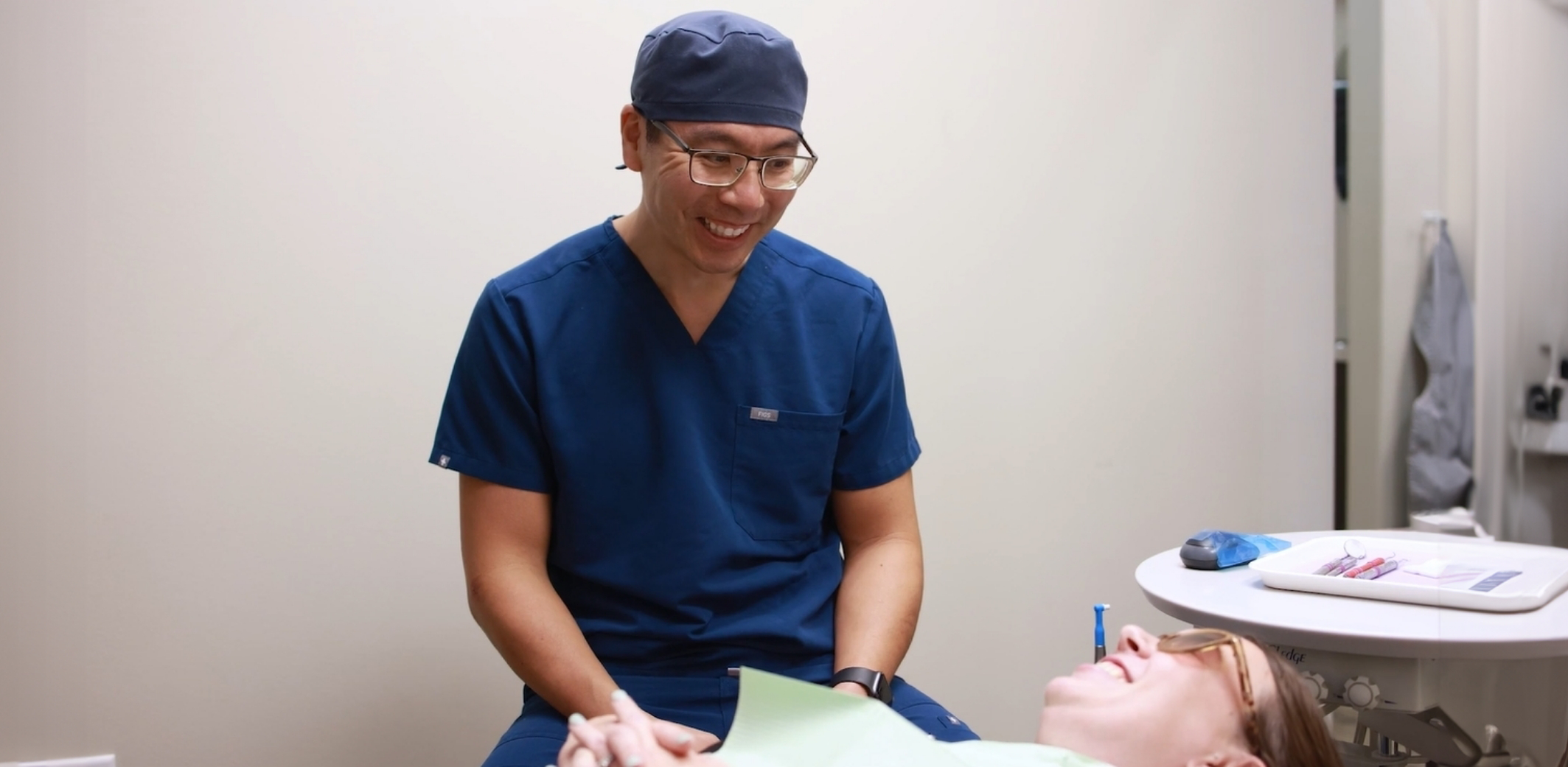Emergency Dentist Rowlett
Your Dental Injury Deserves Immediate Care
An accidental fall, poor oral hygiene, a hard hit on the football field, or biting into a crisp apple are all instances that can result in a dental emergency. Although each type of injury can range in severity, the pain that often comes with it is something you shouldn’t have to endure for a long period of time. This is why our team at Sweet Family Dentistry is here to provide same-day emergency appointments. Simply call our office and we’ll get you in as quickly as possible so that you can go home with a new and improved pain-free, damage-free smile thanks to the emergency dentist in Rowlett.
Why Choose Sweet Family Dentistry for Emergency Dentistry?
- Same-Day Emergency Appointments
- Compassionate, Caring, & Sweet Dental Team
- We Will Help Maximize Your Dental Benefits
How We Treat Dental Emergencies

- Call to schedule an appointment – We’ll get you in as quickly as possible once we know what the problem is. We’ll also help you manage the pain at home by offering tips you can use until your appointment.
- Allow us to examine your smile – Once in our office, Dr. Chan will begin to examine your smile using digital imaging and a visual evaluation to determine the underlying problem. He’ll then formulate a treatment plan and go over it with you.
- Get the care you need – After agreeing to the proposed plan, we’ll quickly help you out of pain and provide the essential care your smile needs.
The Most Common Dental Emergencies
As you will see below, we treat all types of dental emergencies. While some, like a knocked-out tooth, are more time-sensitive than others (i.e., a lost dental crown or filling), we encourage you to call our office to let us know of your situation so that we can get you the help you need right away.
Understanding the Cost of Emergency Dentistry

Naturally, there are a lot of questions surrounding the cost of emergency dentistry. Don’t worry – our Rowlett dental team won’t leave you in the dark. Instead, we will provide you with an estimate of the price at your appointment and determine whether or not your dental insurance will cover a portion of it. If the answer is “no,” then we will review the other financial solutions available, like our in-house dental savings plan. In the meantime, you can read on to learn more about the cost.
Why Every Dental Emergency is Different

In short, the cost of emergency dentistry is different for everyone because no two situations are exactly the same. In order to determine the cost of your care, we need to first determine what the root of the problem is, like a small cavity or a serious infection in your gums. From there, we can review your treatment options, create your custom treatment plan, and provide a price. Like we mentioned above, we will also review the financial solutions available to ensure that navigating the financial side of your care isn’t stressful.
Does Dental Insurance Cover Dental Emergencies?

Oftentimes, dental insurance providers cover a portion of the cost – whether it’s the price of the exam or 50% of the restorative care needed. So, make sure to take a look at the fine print on your plan to see what is and isn’t included. If you need help, let us know! We pride ourselves in being an insurance-friendly practice, and we are in-network with multiple plans. So, we can help you understand and utilize your benefits.
Other Options for Making Dental Emergencies Affordable

If you don’t have dental insurance at the moment, inquire about the other financial solutions we offer! For example, we have an in-house dental savings plan (known as our “Kit Kat Plan”), which comes with several benefits, including a 20% discount on all in-office services. We welcome flexible financing with CareCredit as well. So, if you’d like to break down the cost into smaller monthly chunks that fit into your budget, that’s an option too!
How Taking Care Of Your Smile Can Save You Money

In an attempt to save money, some patients try to ignore warning signs of trouble, like a painful toothache or bleeding gums. Unfortunately, this often has the opposite effect. That’s why we recommend scheduling an appointment with us ASAP if you notice that something is wrong. The sooner we pinpoint the root of the problem, the sooner we can treat it, saving you from costly restorative care in the process.
Important note: Good oral hygiene habits, like brushing twice a day and rinsing with an antimicrobial mouthwash consistently, will also go a long way in keeping your teeth and gums healthy. So, make that a priority as well!
Keys to Preventing Dental Emergencies

Although our Rowlett dental team is always here to help, we hope that you never experience a painful, stressful dental injury. That’s why we prioritize preventive care – from providing routine checkups to sharing how you can maintain a healthy, happy smile at home. If you’d like more information on how to protect your teeth and gums from harm, then read on!
Visit Your Dentist Every Six Months

One easy way you can reduce your risk of dental damage, including tooth decay, is by scheduling an appointment with us every six months for a checkup and cleaning. These routine appointments are crucial because they ensure problems that do arise are detected and treated early on. Plus, they ensure plaque, tartar, and other debris are removed from your teeth before they wreak havoc on your oral health. So, make sure you have an appointment with us on the calendar twice a year, every year!
Brush and Floss Consistently

Brushing and flossing consistently is also crucial. Otherwise, residue from what you drank and particles from what you ate will be left on your teeth for hours on end, increasing your risk of cavities and gum disease in the process. That’s why you need to brush your teeth for a full two minutes each morning and night (and don’t use an old toothbrush – you should replace yours every three months or so!). Make sure that you are flossing every night before bed too.
Stick to a Nutritious Diet

Eating nutrient-dense foods, like carrots, bananas, and broccoli, doesn’t just benefit your overall health. It benefits your oral health as well! For this reason, we recommend adopting a well-balanced diet that’s loaded with the vitamins, minerals, and nutrients your body needs. It’s also important to keep popcorn, peanut brittle, hard pretzels, and other foods that are extremely crunchy to a minimum. That way, you’re less likely to chip or crack a tooth.
Wear a Mouthguard to Protect Your Teeth

There’s a common misconception that you only need to wear a mouthguard if you participate in a contact sport, like football. In reality, you should wear one even if you just like to ride your bike, run, rollerblade, or skateboard. That way, your smile is protected if you accidentally fall! We also recommend scheduling an appointment with us to have a mouthguard made if you grind or clench your teeth at night (which is a condition known as Bruxism).
Break Bad Habits

Biting your nails may seem like a harmless habit, but it can lead to small chips and cracks. Similarly, chewing on ice cubes can lead to a fracture and smoking can wreak havoc on your gums. In other words, even if it seems innocuous, there’s a chance that habits like these could result in a serious dental injury. So, do your best to quit before that happens!
Dental Emergency FAQs
Will a Toothache Go Away on Its Own?
Generally speaking, toothaches do not go away on their own. For this reason, it is a good idea to schedule an appointment with Dr. Yip or Dr. Chan to make sure nothing is wrong. There are many potential reasons you may have a toothache. It is best to rule them out as soon as possible to prevent them from getting worse.
Sometimes, pain will originate around the tooth, and not inside, such as with gum irritation. This type of pain may go away on its own.
Can I Pop a Dental Abscess on My Own?
Never, under any circumstances should you ever attempt to pop a dental abscess. Always contact your dentist as soon as possible, as a tooth or gum abscess is considered a dental infection, and therefore a dental emergency.
Popping an abscess will only expose your mouth to more bacteria and cause greater irritation. Additionally, delaying treatment can allow the infection to spread throughout the mouth, neck, throat, and head.
How Long Can a Tooth Last After It Has Been Knocked Out of Your Mouth?
Your tooth will begin to die approximately 15 minutes after it has been knocked out. Therefore, for the best odds of saving it, you should go to your emergency dentist in less than 30 minutes.
In some cases, teeth can still be saved even if they have been outside of the mouth for over an hour.
You can help preserve a tooth by placing it back into the socket, storing it inside your mouth in the space between your gums and cheek, or by putting it in a container filled with saline solution, milk, or with a tooth preservation kit.
How Long Can I Go Without a Crown After It Falls Off?
Your tooth will not be in immediate danger following the loss of a dental crown; it should be able to survive several weeks without it. However, this does not mean that you should leave the tooth exposed for too long, as it will still be vulnerable to attacks by harmful bacteria.
Your tooth will also be more sensitive than normal, and therefore more likely to sustain further damage if left untreated.
I Need a Checkup & Cleaning I Need a Dentist for My Child I Have a Cavity or Broken Tooth I am Missing One or More Teeth I Want to Enhance My Smile I Want a Straighter Smile View Our Services

